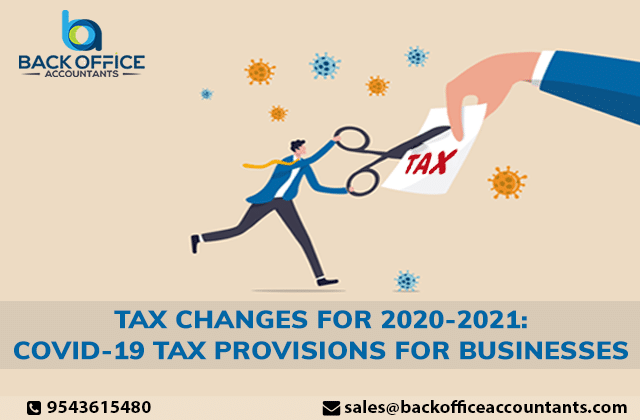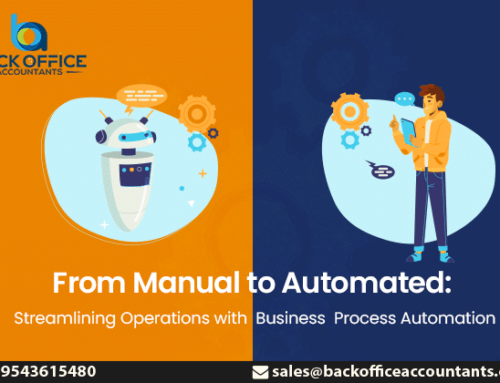Filing the tax returns for businesses has not always been an easy nut to crack for businesses and with scores of new tax provisions offered by CARES Act and updated new tax rules & regulations, it pays to get started early.
Having a head start helps businesses and individuals leverage the benefits by starting the tax preparation early, and to help you do that our folks at Back Office Accountants are here to help you with complete information about the recent tax updates and provision granted by CARES Act as you move forward with your tax preparation. While we have provided you with essential tax planning tips for tax preparation 2020-21 here, this blog is about the tax changes for 2020-21 that you must keep in mind as you file your taxes for 2020. So read on:
COVID-19 – The Economic Disruption & Tax Provisions for Businesses:
The COVID-19 pandemic and the lockdown that followed has drastically impacted both businesses and individuals like never before in history. The disarray in the supply and demand chain, health effects on the employees and loss of sales revenue has resulted in an economic disruption resulting in an almost 51% of small and medium businesses temporarily closing down and millions and Americans losing out their jobs.
The federal government’s CARES Act with its stimulus package in the form of the businesses loans, unemployment benefits, and Paycheck protection programs has helped a lending hand to minimize the damage of the pandemic. The CARES Act has also come-up with scores of tax provisions, new tax rules and regulations for 2020 that both businesses and individuals can make benefit to make significant tax savings.
Key CARES Act Tax Provisions for Businesses:
- Employee Retention Credit for Businesses: Employee Retention Credit is a refundable tax credit for businesses against the employment taxes that can be claimed by eligible employers who can continue their employees on the payroll.Employers can claim refundable employee retention tax credit that is equal to 50% of qualified wages paid to employees between March 13, 2020, and December 31, 2020, to the employees. The maximum wage for an employee is capped at $10,000 and the maximum tax credit is fixed at $5000 on each employee across all quarters. Businesses that are forced to suspend their operations fully or partially or have experienced a significant deadline in gross receipts during any of the quarters in 2020 are eligible for the tax credit.
- Net Operating Loss Carrybacks: CARES Act now has granted businesses to carry back their Net Operating losses generated in 2020, 2019, and 2018 to the earliest year in the carry back period of five-years which was previously 2 years. Any NOLs from 2020, 2019, and 2018 that remain after carrying back to five-year period can be still carried forward indefinitely. Corporate taxpayers can use this CARES Act law to carry back post-TCJA NOLs to offset higher tax income paid in those years, depending on their current situation. Taxpayers must plan to use these carrybacks by accelerating the deductions, shifting the income into 2019 and losses in 2020 to maximize the NOLs for 2020 for leveraging the Carrybacks effectively.
- Deferral of Social Security Tax: CARES Act has allowed all the employers to defer their share of Social Security Tax (6.2%) on wages paid from March to December. A 50% of these taxes can now be deferred to December 31, 2021, and other fifty per cent to December 31 2022. This new rule also grants the same 50% leeway to the tax liability of sole proprietors and partners
- Changes to Business Interest Deduction: Previously deduction on interest expense which was limited to 30% of ATI (adjusted tax income) is now increased to 50% of the ATI for the years 2020 and 2019.
- Accelerated Credit for AMT: Corporations have been provided with an opportunity to offset tax liability with AMT credits and the leftover credits become refundable from 2018 to 2021. The CARES Act accelerates the refund procedure and makes the carryover tax credits fully refundable in either 2019 or 2018.
- Bonus depreciation for QIP: CARES Act corrects the drafting errors of TCJA Act of 2017, treats the QIP (Qualified Improvement Property) as 15-year property and now allows the taxpayers to claim 100% bonus depreciation that is eligible for said QIP. This new change applies retroactively to all the property place in service on or after 2018. It must be noted that QIP does not include expenditures accounted for enlargement of the property, escalator or elevator or internal structures changes to the internal framework of the building. The purchase of real estate cannot be accounted and the eligible property improvement must be made by the taxpayer (not by the seller) to leverage the tax benefits.
While the above 5 are the key tax provisions that can be leveraged by business, there are plenty of tax-saving opportunities for individuals as well which we will be discussing on our next blog. If you are a business owner looking to leverage the above tax provisions or need more information about implementing them for your tax filing our tax experts at Back Office Accountants can help you. In addition to providing expert remote accounting services, we have been offering complete tax support for small and medium businesses for years now and can help you. You can contact us her: www.backofficeaccountants.com







